Raising Backyard Chickens: Beginners Guide
- February 20, 2024
- 0 comment
Raising backyard chickens offers a multitude of benefits, including the ability to produce your own organic eggs, contributing to a sustainable lifestyle, and enjoying the simple pleasures of connecting with nature right in your own backyard.
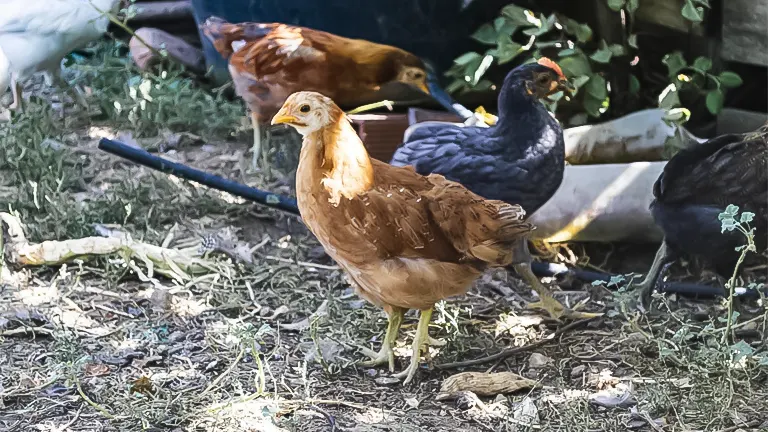
This comprehensive guide is designed to simplify the journey into poultry keeping, demonstrating that with just a small outdoor space, you can successfully rear chickens.
Whether you’re drawn to the idea for the environmental benefits, the health perks of fresh eggs, or the enriching experience of caring for these animals, embarking on this adventure is both accessible and rewarding for enthusiasts of all levels.
List of Raising Backyard Chickens:
- Setting Up Your Brooder
- Feeding Your Chicks
- Preparing the Coop
- Transitioning Chicks to the Coop
- Feeding Your Chickens
- Egg Laying Basics
- Health and Safety
- Enjoying Your Chickens
Choosing Your Chickens
Choosing the right chickens to start your backyard flock is a critical decision that sets the tone for your poultry-keeping experience. For beginners, the journey often starts with selecting between day-old chicks, which are cost-effective yet necessitate the establishment of a warm, safe brooder environment to nurture them until they are ready to transition outdoors.

Alternatively, opting for ready-to-lay pullets can be a more straightforward path for those eager to see a quicker return on their investment, as these birds are on the cusp of laying eggs and have bypassed the fragile early stages of life. However, for an immediate supply of eggs, adopting adult hens is an option, though it comes with its own set of challenges, including the birds’ potential difficulty in adapting to a new home and integrating with existing flock members.
Each choice offers distinct advantages and considerations, from the initial cost and care requirements to the timing of your first egg collection, making it important to weigh your options based on your commitment level, patience, and long-term goals for raising chickens.
1. Setting Up Your Brooder
A brooder’s primary role is to replicate the warmth and security chicks would normally get from a mother hen. Using a cardboard box as a container is practical; it should be equipped with a heat lamp to keep the environment at the requisite 95°F during their initial week of life.

This temperature needs to be reduced by 5°F each subsequent week to match the chicks’ developing ability to regulate their body temperature. The inclusion of bedding material, such as pine shavings, helps absorb waste and provides comfort, while monitoring and adjusting the heat source ensures the chicks’ environment remains conducive to healthy growth.
2. Feeding Your Chicks
In the early stages of life, chicks need a diet rich in protein to facilitate their rapid growth, necessitating the use of a high-protein starter feed.
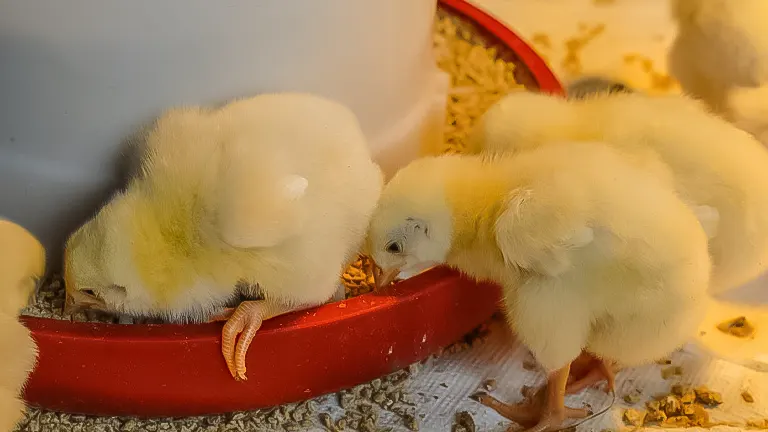
As they grow older, transitioning them to a grower feed is necessary until they reach the age where they can be switched to layer feed, designed to support egg production.
Access to clean, fresh water is critical throughout all stages of their development, and the introduction of probiotics to their water supply can aid in establishing a healthy digestive system.
3. Preparing the Coop
As chicks mature, they require a transition to a coop, which must be spacious enough to accommodate the birds comfortably, with the general guideline being approximately 3 square feet per chicken inside the coop.
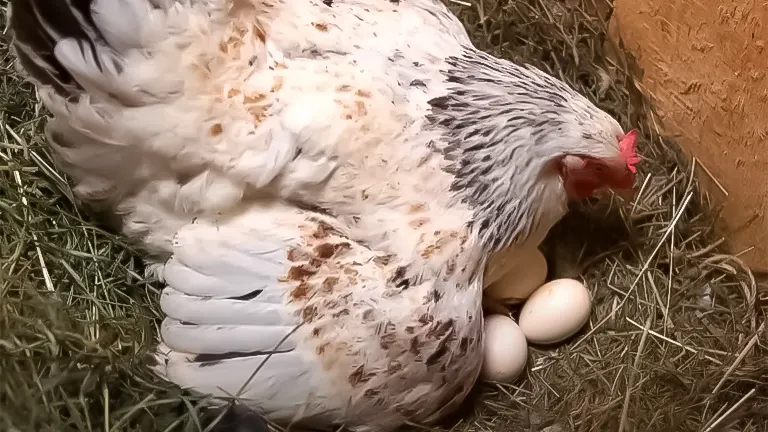
The coop must have adequate ventilation to ensure air circulation without causing drafts and secure nesting areas for laying eggs. An attached outdoor run provides necessary space for exercise and exploration, contributing to the chickens’ overall well-being and safety.
4. Transitioning Chicks to the Coop
When chicks are around 6-8 weeks old and have developed their feathers, they are prepared to move to the coop.
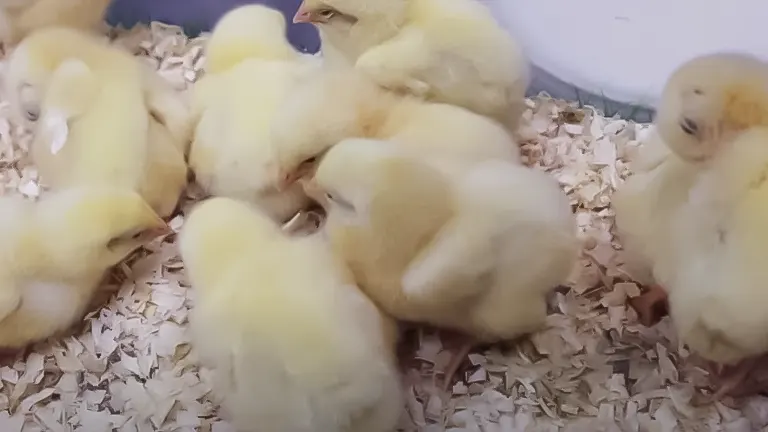
This process should be done gradually to allow the chicks to adjust to their new environment and the outdoor temperatures, ensuring a smooth transition from the controlled conditions of the brooder to the more variable conditions of the outside world.
5. Feeding Your Chickens
The diet of adult chickens should be well-rounded, consisting mainly of layer feed complemented by kitchen scraps. This dietary base supports egg production and overall health.
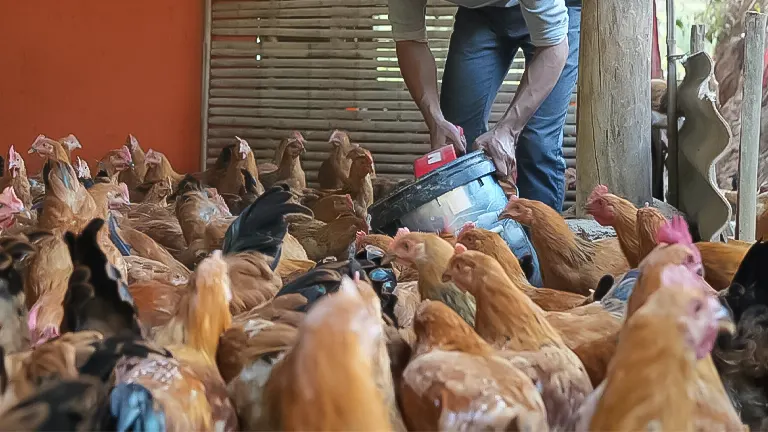
Continual access to fresh water is essential, and the diet’s composition can affect egg quality, with greens and proteins potentially enhancing the nutritional value and appearance of the yolks.
6. Egg Laying Basics
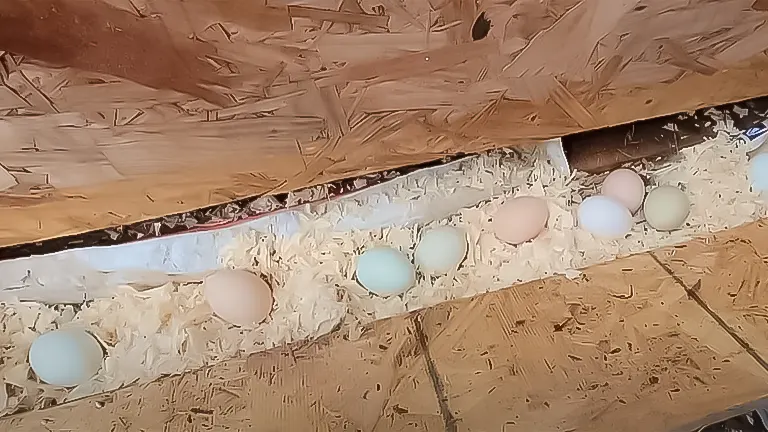
Chickens typically start laying eggs at about 6 months of age. To promote egg-laying, provide nest boxes that are comfortably sized and shaded to offer privacy and security. Regular egg collection is important to maintain cleanliness within the coop and to ensure the freshness of the eggs.
7. Health and Safety
Maintaining the health and safety of your flock involves regular health inspections and a secure coop environment to safeguard against diseases and predators.
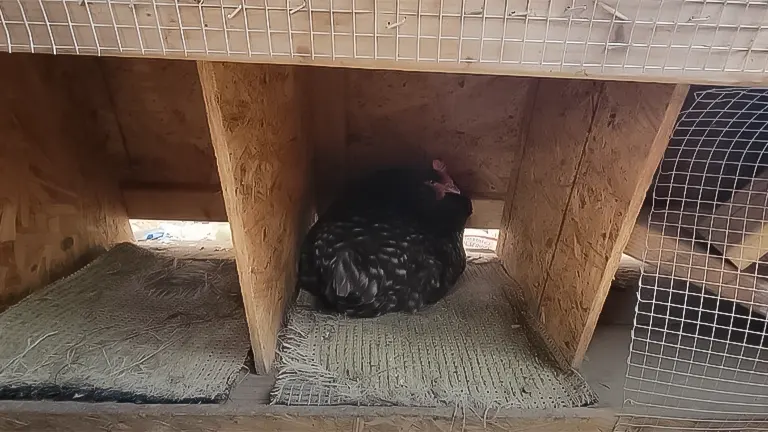
Effective management practices, such as keeping the coop clean and securing it against potential threats, are crucial in preventing illness and ensuring the well-being of the chickens.
8. Enjoying Your Chickens
Keeping chickens offers more than just the practical benefits of eggs and natural pest control; it also provides an opportunity for companionship and entertainment.
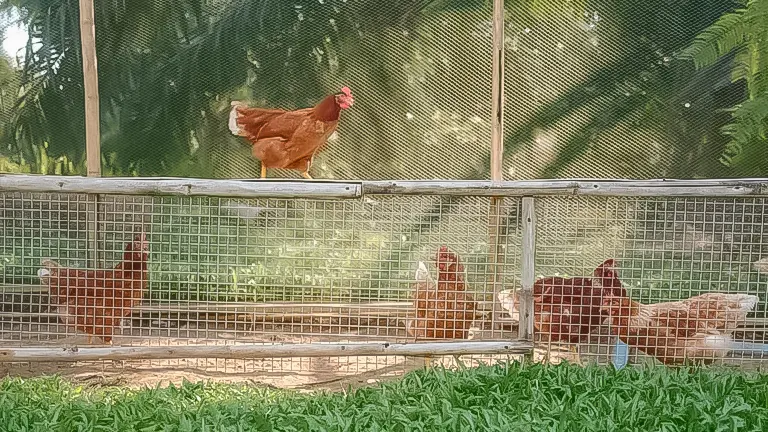
Regular interaction with your chickens can be a source of relaxation and enjoyment, enriching the experience of backyard chicken keeping beyond the basic care tasks.
Additional Tips
- Regular Health Monitoring: Establish a routine to check the health of your chickens. This includes looking for signs of parasites, such as mites or lice, checking their feathers for abnormalities, and observing their behavior for any signs of distress or illness. Early detection of health issues is key to preventing them from spreading within your flock.
- Varied Diet for Nutritional Balance: While commercial feeds are formulated to provide all the necessary nutrients, offering a variety of foods can enhance your chickens’ diet. This includes providing kitchen scraps (avoiding toxic foods like onions and chocolate), garden weeds, and occasional protein treats like mealworms or cooked eggs. A varied diet not only improves health but can also enrich the taste of the eggs.
- Seasonal Considerations: Be mindful of the changing seasons and how they affect your chickens. In hot weather, ensure they have access to shade and plenty of water to prevent overheating. During colder months, take measures to prevent the water from freezing and provide extra bedding for warmth. Adjusting their care according to the season will keep your chickens comfortable and productive year-round.
Related Articles:
- Best Bedding For Chickens
- Best Safe Chicken Coop Heater
- 8×8 Chicken Coop Plans
- Turning a Shed Into a Chicken Coop
- How to Make a Chicken Coop Out of Pallets
- Best Sand for Chicken Coop
- How To Insulate a Chicken Coop
- How To Heat a Chicken Coop
- How To Keep Water from Freezing in Chicken Coop
- How to Build a Chicken Coop
- How To Build Chicken Nesting Boxes
- How to Raise Happy and Healthy Chickens in Your Backyard
- When Can Chicks Go Outside? Timing and Tips for a Smooth Transition
- 12 Reasons why Ducks are Better than Chickens
- Best Automatic Chicken Coop Doors 2024: Expert Reviews & Buyer’s Guide
- Best Fans for Chicken Coop 2024: Effective Cooling Solutions Reviewed
Final Concluding Thoughts
Raising backyard chickens emerges as a rewarding endeavor that not only bridges the gap between you and your food source but also enriches your daily life with numerous benefits. This journey, grounded in proper preparation and dedicated care, opens the door to a world where self-sufficiency meets the joy of nurturing life.
Whether it’s the delight of collecting fresh eggs, the satisfaction of contributing to a sustainable lifestyle, or simply the companionship offered by these feathered friends, chicken keeping is an accessible and gratifying pursuit. With the right approach, anyone can transform a small piece of their backyard into a thriving hub of productivity and pleasure, reaping the rewards that come with raising chickens and enjoying the tangible connection to the natural world.
Frequently Asked Questions
- What do I need to start raising backyard chickens?
To start, you’ll need a secure coop, a brooder for chicks, starter and layer feed, waterers, feeders, bedding material, and of course, chickens. Research local regulations to ensure you comply with any zoning laws or restrictions. - How many chickens should I get?
Begin with a small flock, considering local regulations and your space. A good starting point is 3-5 chickens to ensure they keep each other company and maintain social structures without overcrowding. - Do I need a rooster for my hens to lay eggs?
No, hens will lay eggs without a rooster. Roosters are only needed for fertilization to hatch chicks from the eggs. - What type of feed do chickens need?
Chicks require a high-protein starter feed, transitioning to grower feed as they age, and eventually to layer feed once they start laying eggs. Supplement their diet with kitchen scraps and garden waste for variety. - How do I protect my chickens from predators?
Secure the coop with hardware cloth, ensure it’s completely enclosed, including the run, and consider automatic door closers. Regularly inspect for potential vulnerabilities and make necessary improvements. - How much space do chickens need?
Inside the coop, plan for at least 3 square feet per chicken, and in the run, aim for 8-10 square feet per bird to ensure they have enough room to move, forage, and express natural behaviors. - How often do chickens lay eggs, and what affects their laying?
Most hens lay an egg every 24-26 hours, influenced by factors like breed, age, nutrition, and daylight. Egg production may decrease during winter months due to reduced daylight hours. - What common health issues should I watch for in my chickens?
Monitor for signs of respiratory problems, parasites like mites and lice, and behavioral changes indicating illness. Regularly check their physical condition and consult a vet if you suspect health issues. - Can I let my chickens free-range?
Yes, if your space and local regulations allow. Free-ranging provides exercise and natural foraging opportunities, but ensure they’re protected from predators and secure them in the coop at night. - How do I handle chicken waste?
Implement a management strategy like the deep litter method or regular cleaning to handle waste. Chicken manure can be composted and is an excellent fertilizer for gardens after proper aging.
We’re eager to hear your stories and insights! Share your personal experiences and thoughts on raising backyard chickens in the comments section below. Whether you’re a seasoned chicken keeper or just starting out, your contributions could help fellow enthusiasts navigate their own backyard chicken adventures more confidently. Your tips, challenges, and successes can provide valuable guidance to others looking to embark on this rewarding journey!

Edward Smith
Forestry AuthorWoodworking is about more than crafting; it's a harmonious connection with nature, mastering tools, and preserving our environment. I'm here to share my knowledge and experiences with you, forging a future where we can embrace wood's beauty and utility while safeguarding our forests' health and diversity.













Leave your comment